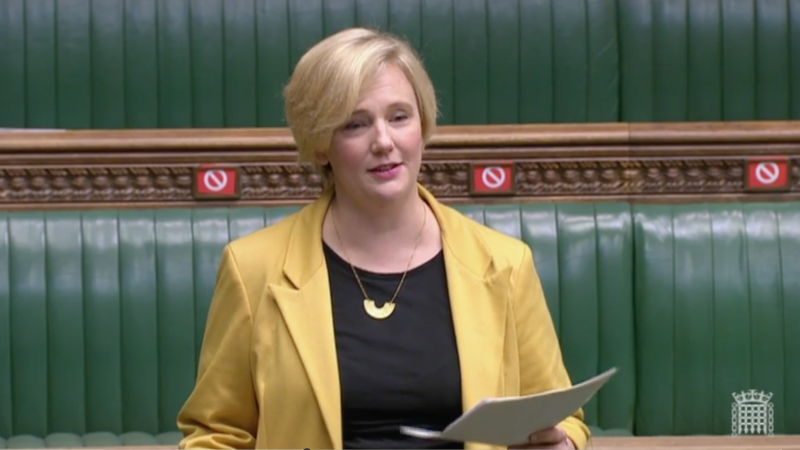
Stella Creasy told parliament that “188 years later, we are still waiting” this afternoon as she introduced proposals to require wider reporting from organisations in relation to data on their gender pay gap.
Presenting her bill in the Commons this afternoon, the Labour backbencher highlighted that nine in ten women in the UK are working for a company in which women are on average paid less than their male counterparts.
The proposed law, put forward today with cross-party support, would lower the threshold for those organisations required to publish gender pay gap data from 250 employees to 100, alongside a number of other measures including:
- Allowing women to request data relating to a male colleague if they think there might be a gap.
- Requiring mandatory plans of action to fix any gender pay gap identified.
- Removing the time limit on women being able to claim back pay.
- Giving women back pension rights lost because of pay discrimination.
- Awarding damages for the emotional harm suffered as a result of discrimination.
- Making sure that current rules protecting women’s equal pay rights are retained after Brexit.
Creasy said: “You could be forgiven for thinking that we’ve been here before because women have been asking for equal pay since 1833. The first recorded instance was in Robert Owen’s Labour Exchange…
“188 years later, we are still waiting. Indeed, last year alone there were 30,000 equal pay claims made at tribunal. So, too, this year we’ve seen that the gender pay gap is actually increasing, not closing.
“That means that nine out of ten women in this country work in companies and organisations that pay them less on average than their male counterparts, even in 2020. And I want to start by just nailing that it is the fault of the women themselves.
“It’s not because they have kids or because they don’t ask for pay rises. The evidence is crystal clear. Absolutely, there is a pay penalty for having a kid…
“But that pay penalty was there before those children were born. And the evidence is also clear that women ask just as often for a pay rise, but men are four times more likely to receive it.
“The research shows that the impact of the gender pay gap comes from a mixture of things, including working for less productive companies, wanting to work part-time and good old fashioned discrimination. Even being a graduate doesn’t help as the pay gap begins early on in many women’s careers.”
The Labour MP for Walthamstow added: “While women first started asking about equal pay in 1883, they still don’t have it. We have started the conversation and now we need action.”
Creasy used her speech today to tell MPs that the coronavirus pandemic has shown why parliament needs to act now, pointing out that there are “more mums being made redundant and furloughed than their male counterparts” in the crisis.
The Government Equalities Office announced in March that it would not be taking action against employers that fail to submit their pay gap data due to the pandemic, effectively suspending the requirement for the year.
Shadow Women and Equalities Secretary Marsha de Cordova slammed the move as “negligent”, pointing out that coronavirus “thrives on inequality” and that such inequalities “amplify the impact of the pandemic”.
She said: “The pandemic has shown that women are more likely than men to take over caring duties, more likely to be made redundant and make up most of the workforce within the health and social care sector.”
Creasy’s bill follows campaigning by Pregnant Then Screwed earlier in this year, which saw the group take legal action against the government for discrimination against women in the self employment income support scheme.
Similar to the way in which women who take maternity leave face discrimination on mortgage applications, those with young children were disadvantaged by support being based on a calculation of profits over the past three years.
Any woman who took maternity leave in that period automatically received less support than their male counterparts, with the impact being particularly felt on single mums. The Chancellor’s new ‘job support scheme’ has the same flaw.
The last Labour government reduced the gender pay gap in the UK by 7.7%, whereas progress under the current Conservative government has seen a minimal decrease in the pay gap of only 2.4% since 2011.
The bill presented this afternoon was also backed by MPs Nadia Whittome, Caroline Noakes, Bell Ribeiro-Addy, Harriet Harman, Neil Gray, Christine Jardine, Caroline Lucas, Florence Eshalomi, Chris Bryant, Chris Evans and Anne McLaughlin.
The legislation passed its first reading in the Commons unopposed. As a ten-minute rule bill, it is unlikely to make further progress as this type of bill is not given priority in the parliamentary calendar.
"Women have been asking for equal pay since 1833… we are still waiting"
Labour MP Stella Creasy is calling for a change in the threshold at which point businesses must publish their gender pay gap datahttps://t.co/KV8UwJ09bN pic.twitter.com/HBsuQIIZ4I
— BBC Politics (@BBCPolitics) October 20, 2020




More from LabourList
Antonia Romeo appointed to lead civil service as new Cabinet Secretary
‘If Labour is serious about upskilling Britain, it must mobilise local businesses’
Stella Tsantekidou column: ‘What are we to make of the Labour Together scandal?’